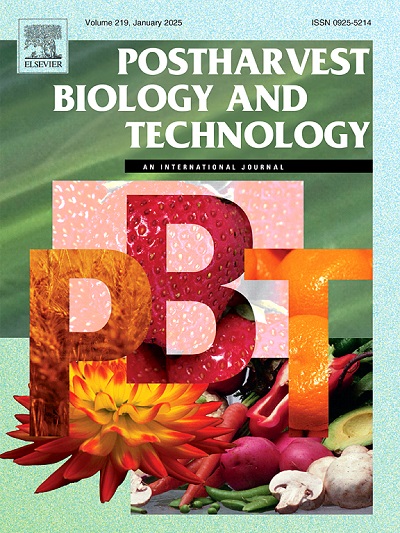CmERFⅠ-5和CmERFⅤ-2对低温条件下采后东瓜果实乙烯合成和蔗糖积累的影响
IF 6.4
1区 农林科学
Q1 AGRONOMY
引用次数: 0
摘要
采后低温贮藏对依赖乙烯的果实成熟和攀缘瓜果的蔗糖积累有重要影响;然而,乙烯在低温下影响糖分含量的分子机制仍不清楚。本文在乙烯释放初期(花后30 d,DAA)采收'高蔗糖'('HS')甜瓜果实,并在不同温度(25 ℃、10 ℃和4 ℃)下处理。结果表明,两种低温处理的甜瓜果实蔗糖含量和蔗糖率都较低,但淀粉含量、己糖含量、液泡转化酶(VINV)活性和 CmVINV2 表达量都较高。此外,低温条件下乙烯产量和 CmACO1(ACC 氧化酶 1)表达量较低。低温处理对乙烯响应因子 CmERFV-2 和 CmERFI-5 的表达分别有正向和负向调节作用。我们发现,CmERFV-2 和 CmERFI-5 可分别正向调节 CmVINV2 和 CmACO1 的启动子。农杆菌介导的瞬时转化进一步验证了 CmERFV-2 沉默和 CmERFI-5 过表达可提高蔗糖水平并产生更多乙烯。总之,采后低温处理促进了 CmERFV-2 的表达,抑制了 CmERFI-5 的表达,分别激活了下游 CmVINV2 和 CmACO1 的转录,最终影响了糖分含量和乙烯的生物合成。低温下乙烯产量降低,淀粉降解减少,从而影响瓜果的糖分积累。这项研究解释了低温条件下采后倭瓜果实甜度降低的原因,并为在低温条件下保持风味品质提供了新的见解。本文章由计算机程序翻译,如有差异,请以英文原文为准。
CmERFⅠ-5 and CmERFⅤ-2 affect ethylene synthesis and sucrose accumulation in postharvest oriental melon fruit at low temperature
Postharvest low-temperature storage crucially affects ethylene-dependent fruit ripening and the sucrose accumulation of climacteric melon fruit; however, the molecular mechanism by which ethylene affects sugar content at low temperature remains unclear. Here, ‘High Sucrose’ (‘HS’) melon fruit were harvested at the initial stage of ethylene release (30 d after anthesis, DAA) and treated at different temperature (25 ℃, 10 ℃, and 4 ℃). The results revealed that both low temperature treatments had a lower sucrose content and sucrose percentage while also having a higher starch content, hexose level, vacuolar invertase (VINV) activity, and CmVINV2 expression in the melon fruit. Moreover, the ethylene production and CmACO1 (ACC oxidase 1) expression were lower at low temperature. Both low-temperature treatments positively and negatively regulated the expression of the ethylene response factors CmERFV-2 and CmERFI-5, respectively. We found that CmERFV-2 and CmERFI-5 could positively regulate the promoters of CmVINV2 and CmACO1, respectively. The agrobacterium-mediated transient transformation further verified that CmERFV-2 silencing and CmERFI-5 overexpression resulted in higher sucrose levels and produced more ethylene. In short, postharvest low-temperature treatments promoted CmERFV-2 expression and inhibited CmERFI-5 expression, which activated the transcription of downstream CmVINV2 and CmACO1, respectively, ultimately affecting sugar content and ethylene biosynthesis. The lower production of ethylene at low temperature reduced starch degradation, thereby affecting sugar accumulation in melon fruit. This study explained the cause for the lower sweetness of postharvest oriental melon fruit at low temperature and provided new insights into maintaining flavour quality at low temperature.
求助全文
通过发布文献求助,成功后即可免费获取论文全文。
去求助
来源期刊

Postharvest Biology and Technology
农林科学-农艺学
CiteScore
12.00
自引率
11.40%
发文量
309
审稿时长
38 days
期刊介绍:
The journal is devoted exclusively to the publication of original papers, review articles and frontiers articles on biological and technological postharvest research. This includes the areas of postharvest storage, treatments and underpinning mechanisms, quality evaluation, packaging, handling and distribution of fresh horticultural crops including fruit, vegetables, flowers and nuts, but excluding grains, seeds and forages.
Papers reporting novel insights from fundamental and interdisciplinary research will be particularly encouraged. These disciplines include systems biology, bioinformatics, entomology, plant physiology, plant pathology, (bio)chemistry, engineering, modelling, and technologies for nondestructive testing.
Manuscripts on fresh food crops that will be further processed after postharvest storage, or on food processes beyond refrigeration, packaging and minimal processing will not be considered.
 求助内容:
求助内容: 应助结果提醒方式:
应助结果提醒方式:


